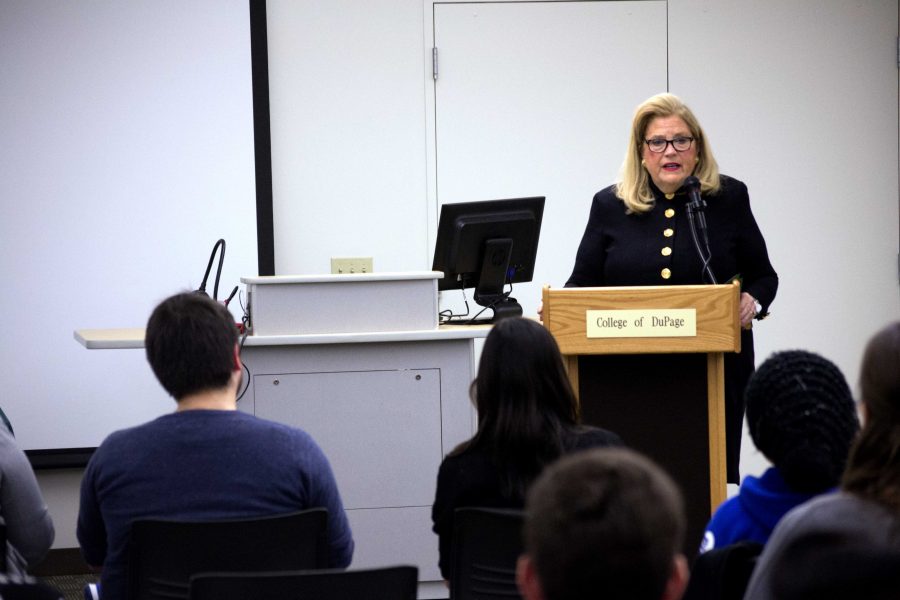Patricia Bellock leads panel discussion on human trafficking in Illinois
PTK’s way to bring to an end human trafficking awareness week
December 6, 2016
Brenda Stewart, 51, grew up in Englewood with a family that wasn’t into gangs nor selling drugs. Still, she lived in the streets at a point in her life and decline an offer from her mother to return home. She was raised by an alcoholic father, molested by an uncle, and got in a relationship with an abusive gang member.
“I lost my self-esteem,” said Stewart. “Four years ago, I was living in this condo and driving a nice car. I was living with this man and thought he was my man. He was a trick, and we have been together for seven years and still couldn’t be sober. I was there for the wrong reason because I still wanted to maintain the lifestyle that I was used to. The ladies at Dreamcatcher told me I can pay my own phone bill, buy a car, pay my rent and get a job. They became my mentors, sisters, and friends. It is not easy coming out from the streets.”
Chicago Dreamcatcher Foundation works “to prevent the sexual exploitation of at-risk youth and helps current prostitutes find confidence and stability beyond the limitations of their current lifestyle.”
These are the stories we don’t hear about and this is what a task force organized to address the issue of human trafficking wants to tackle. Women and girls who are trafficked go through bad experiences similar to Stewart every day in Illinois.
In Chicago, 16,000 to 25,000 women are brought into trafficking in the metropolitan area every year, and one-third of those trafficked have an average age of 15. This, according to Patricia Bellock, Illinois’ 47th District representative, necessitated the creation of a human trafficking task force in the state after she introduced and sponsored House Bill 2822 earlier this year.
“Those are the facts we want to bring out so that people understand the real severity of the problem in Illinois,” said Bellock. “And what you will find shocking about this is, Chicago is one of the biggest hubs of transportation in the United States. Trafficking occurs at O’Hare airport, in Cook County, and it moves out from there throughout the state and other states in the Midwest.”
Federal law defines trafficking in persons as: “sex trafficking in which a commercial sex act is induced by force, fraud, or coercion, or in which the person induced to perform such act has not attained 18 years of age; or the recruitment, harboring, transportation, provision, or obtaining of a person for labor or services, through the use of force, fraud or coercion for the purpose of subjection to involuntary servitude, peonage, debt bondage or slavery.”
The task force, according to Bellock, “will develop a state plan to tackle the shocking rise in human trafficking within the state, aid the establishment of policies to enable state government to work with nongovernmental organizations and other elements of the private sector” and much more.
She is optimistic about a huge success after June 30, 2017, the deadline date for the task force to submit its findings to the Illinois General Assembly. Bellock juxtaposed the task force’s solution methodology to the state’s heroin task force that is responding to the rise of heroin abuse among suburban teens and young adults.
Frank Massolini, from the Salvation Army’s Partnership to Rescue our Minors from Sexual Exploitation (PROMISE), brought a personal feel into the discussion given his time volunteering to help combat the sexual trafficking of children. Massolini has personally helped bring children from Asia who have been victims of trafficking and find them new beginnings in the United States. He cited his organization’s effort to combat the surge of human trafficking in Illinois.
“You have to prevent it from happening,” said Massolini. “We have set a curriculum. We go to high schools and middle schools, and we meet with the kids. We have facilitators who train kids about human trafficking and how to avoid it.”
This panel discussion was organized by the Phi Theta Kappa, one of the college’s honor societies. PTK believes that human trafficking is a world phenomenon, and it is going on in Illinois. The society reckons that women and girls who are victims of trafficking don’t have the voice in their lives and live in constant fear.
“As college students, we have the ability to help victims by allowing them to know that there are laws that target human trafficking,” said Kristina Clancy, PTK’s president at COD.
Read the complete details about the human trafficking task force here: www.repbellock.com
Learn more about the Salvation Army’s PROMISE program here: www.sapromise.org
Learn more about the work of the Dreamcatcher foundation here: www.thedreamcatcherfoundation.org


















